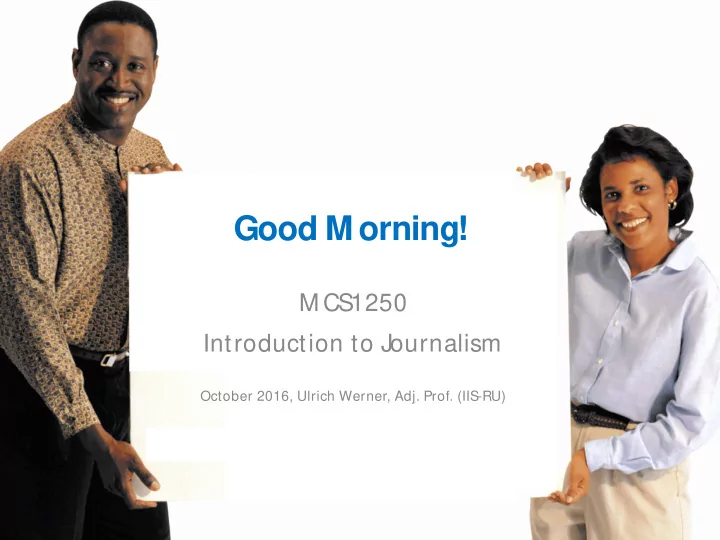

Good M orning! M CS1250 Introduction to Journalism October 2016, Ulrich Werner, Adj. Prof. (IIS-RU)
What’s on the Plan for today • Earning and keeping Trust – Journalist Ethics – Fairness and Balance – Plagiarism and Fabrication – Undercover Reporting and Deception
J ournalist Code of E thics
E arning and Keeping Trust – J ournalist E thics • Laws – can’t govern each and every situation • Journalist Associations and M edia Companies have their own Code of Ethics – Guiding through the decision-making process – Designed to give you some basic principles – How is helped by my reporting? Who is hurt by my reporting? What is the ethical thing to do?
U.S . – S .P .J . Code of E thics • Sections: – Seek truth and report it – M inimize harm – Act independently, serve the public – Be accountable and transparent • Keep readers informed what’s going in to your decision- making process • Take responsibility for your work • Codes of Ethics are not legally binding
Undercover Reporting and Deception
Undercover Reporting and Deception • Undercover reporting stories expose major societal problems • But there is a difference between doing an undercover investigation, or simply not identifying you as a journalist in a public place or attending a public event • Undercover reporting needs active deception – You are lying to people about what you’re doing and who you are
Undercover Reporting and Deception • Criminal charges if you break the law • Civil lawsuits for trespassing, fraud or invasion of privacy • Damage to your reputation and credibility (and that of your media organization, if the public becomes angry about your undercover tactics) • Never go undercover without the full knowledge of your editors or superiors
Undercover Reporting and Deception • Are there other ways to effectively get and tell the story? • Who will be deceived? • Will innocent people be harmed? • What will you tell your audience about your methods? • What will you do if there is no story?
Fairness and Balance
Fairness and Balance • Reporting about controversies and disagreements • Your own interests should not undermine providing objective coverage for your audience • Fairness usually means the simple inclusion of the other side in new reports about conflict • Balance concerns how usually sides of a conflict are treated relative to one another in your coverage (that is valid over a longer period of time as well, e.g. presidential campaign speeches)
Fairness and Balance • If you can’t do a fresh interview, regardless of whether the newsmaker is an individual, a company, a government agency, or an association – Previous interviews – Position papers – Letters – TV and radio appearances – Company reports – Court and legal documents in public court files
Plagiarism and Fabrication
Plagiarism and Fabrication • Plagiarism is stealing, and it is unethical. • The same is valid for fabrication, making things up, whether it is news sources, quotes, or so-called facts. • Plagiarism is a serious charge. If true, it has the potential to upend a career and destroy a journalist’s reputation for life.
Determining Plagiarism (Poynter Institute) • Is the central idea or some of the language unoriginal? • Are there quote marks around the unoriginal words? • Is there other attribution? (Attribution is the opposite of plagiarism) • Are there more than 7 to 10 identical words in sequence without attribution or quotations marks?
Avoiding Plagiarism • Carefully take notes and collect background material • Carefully attribute • Carefully re-read and proof-read • Use free checking software such as Grammarly, NoPlag, PlagiarismChecker and CopyLeaks • How would you feel is somebody steals your work? • Treat others like you would like to be treated yourself.
Fabrication • Plagiarism could be deliberate or careless – that’s not an excuse but may affect the punishment • Fabrication is an intentional ethical violation. There is never a legitimate excuse.
If a News Organization finds Plagiarism or Fabrication Take action – don’t ignore the situation: • Ask the journalist for an explanation • Examine his/ her past work for other wrongdoing • Punish the journalist • Publicly admit to the audience what went wrong and apologize • Correct or remove plagiarized or fabricated material from the Web site
Assignment No. 2 consis t of 2 parts. Please find it on the Web page. Have a nice weekend!
Recommend
More recommend